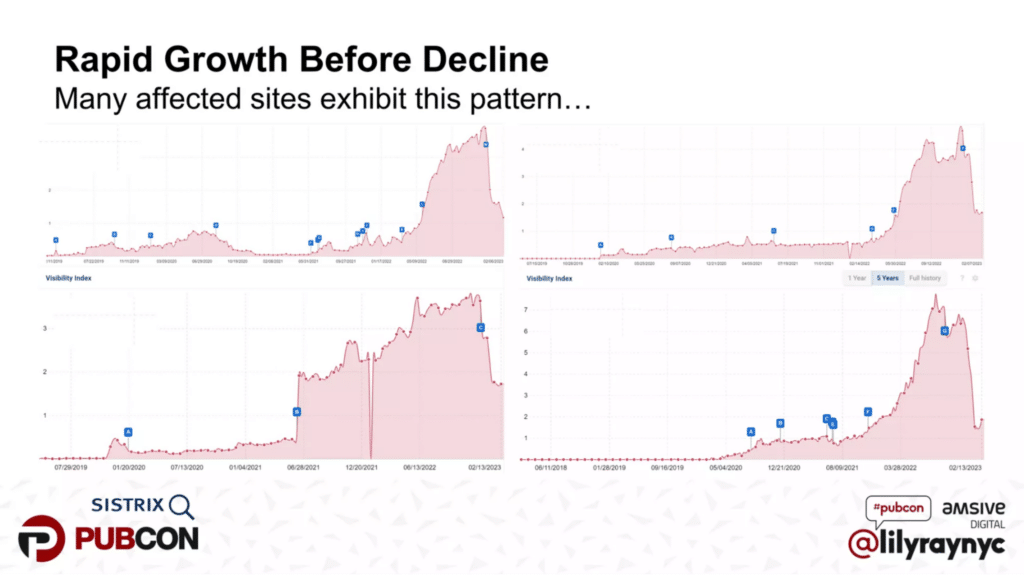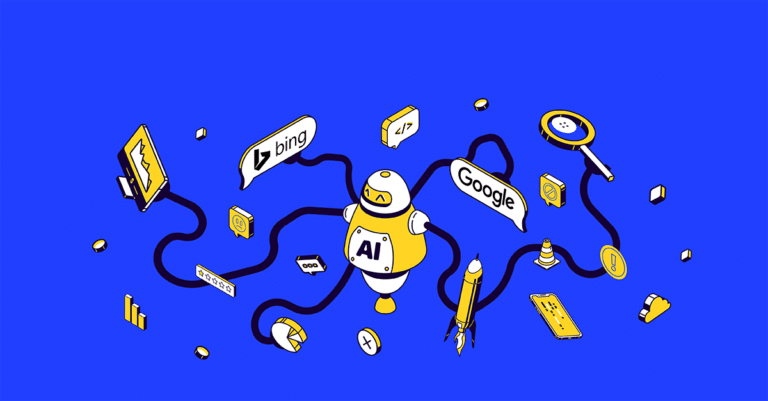AI has revolutionized content generation! At least, that’s what some are claiming.
I’ve been creating web content for a living for over a decade, so I approached AI with morbid curiosity – Would I be meeting my replacement? But, I also had optimism. Automation at its best makes work more pleasant for the human by tidying away the tedious parts. I think I can speak for all writers when I say there is plenty of busy work in this profession.
Lately, I’ve been building out the content creation capabilities at Session Interactive. As a digital marketing agency for high-tech clients, Session stays on top of new technologies, so part of my task was to see if AI could speed up the content creation process. I was instructed not to lose any quality in output, even if that meant not using AI.
My opinion is that AI is not ready to take over content generation or planning. It still needs significant hand-holding. However, it can automate some of the work.
Read on to learn what we have discovered from our AI tests, how viable it seems as a content generation tool, and some thoughts on the future of digital marketing.
In this guide:
Is AI-generated Content Safe to Use for SEO?
The first question many people ask is: can I use AI-generated content on my website? The answer is a categorical yes. Google approves of the use of automation in content creation and even states “AI has the ability to power new levels of expression and creativity, and to serve as a critical tool to help people create great content for the web.”
What Google doesn’t like is spam. In this context, spam is low-quality content intended to manipulate search rankings. And, as any experienced SEO can tell you, spam and low-quality content can certainly be created without the help of AI.
Two important indicators of high-quality content are uniqueness and relevance. Because AI works off of existing text, uniqueness must come from a human. AI tools can recombine ideas and phrases, but can’t generate new information (at least, not yet). Relevance can also be an issue for AI writers because they confuse different topics that share the same words.
With those issues in mind, it is potentially dangerous to use AI content if not carefully vetted. Later in this article, I will describe an example of AI suggesting advice that could be dire to the reputation of any SEO publishing it. AI tools are not currently able to determine true information from false.
But, before we dive into the drawbacks, let me talk about good ways to use AI to create high-quality content.

The Good: What AI SEO Content Gets Right
AI writing tools can be powerful in the right hands. In fact, parts of this article were written by an AI. If I have done my job well, you won’t be able to identify them because they will flow smoothly with the rest of the article.
One area where AI has been useful is in speeding up our content creation process. In web content, consistency is key. Oliver Lynch over at Hackernoon was able to get 1,000 views a month based on publishing largely unedited AI-generated articles over a year. So, even with low-quality content, consistency can get you rankings.
AI can be an effective tool for generating ideas. During the holiday season, we asked our AI tool, Jasper, to generate 30 holiday messages that related to our business in some way. Out of those thirty groaners, I found one that I could edit and use. In that sense, AI can act as a junior writer who suggests possibilities for you to build from.

Here’s the winner: “We’ve crunched the numbers and the data is clear – you’re due for an outstanding holiday season! Best wishes from Session Interactive.” In my opinion, this was the correct amount of corny and I’m glad I didn’t have to write 30 of them.
We’ve found that AI writers do best when provided with detailed notes or when dealing with content that’s widely available online. More niche topics mean fewer sources and more room for error. For the last few years, Google has been emphasizing longer, more comprehensive content, and AI is good at turning a single master article into derivative pieces.
When we attempted an article on credit union marketing planned and executed by AI tools, we got a list of 25 tips and tricks with no particular organization. Most of the writing felt like a high-schooler tasked with hitting a specific word count–lots of loquacious, superfluous filler.
On the other end of the spectrum, we created a piece that was up to our publishing standards by using Jasper.ai along with an experienced content writer (me). Jasper is able to use brand voice and remember brand materials. Its chat function is based on GPT 4.0, so it can read the live internet and process new website information. When I loaded it up with our brand, and the best websites to use as references, and fed it our human-prepared content outline, we got a strong, comprehensive article in about half the time it would take me to write alone. Skip to the end of this article for data on how that page has been doing in SERPs.
Ultimately, AI is limited by its sources. The best pieces I generated came from providing our AI tool with unique insights and sources, then asking it specific questions about those sources. This process allowed the language model to do its thing without muddying the waters with bad research.
In conclusion, integrating AI into our SEO content writing strategy has allowed us to streamline our process, overcome writer’s block, and served as a valuable brainstorming tool. However, it’s important to remember that AI is a tool to enhance human creativity and strategic thinking, not replace them.
Strong SEO Use Cases for AI Content
- Speedy Content Creation – Accelerates content creation and ensures consistency, boosting our SEO ranking.
- Idea Generation – As a brainstorming tool, AI can suggest numerous content ideas, providing raw material for writers to work with.
- Repackaging Content – AI excels at repackaging existing info, creating first drafts of long-form content and reducing writing times.
- Reworking Information – Some AI can be fed information (including websites!) and answer questions about it, which can be a powerful writing tool.
- Streamlining Writing Process – Integrating AI into our writing strategy takes the drudgery out of long-form informational content, letting us focus on strategic thinking and injecting originality.

The Bad: What AI SEO Content Gets Wrong
While it is capable of repackaging widely available content, AI lacks the ability to infuse unique information or expertise into the content. This lack of uniqueness is a significant drawback, as Google values originality and quality in search ranking factors.
Don’t think you’ll be saving a lot of time by switching to an AI writer without an expert AI handler. When it can’t repackage readily available content, you’ll find yourself having to guide it extensively. It’s not uncommon for AI to reuse the same stock phrases and sentence structures, leading to monotonous and repetitive content across sections and pages. Also, it’s a frequent occurrence that AI resorts to recycling identical expressions and sentence constructs, resulting in content that is redundant and unvaried across different sections and pages. Plus, it’s a common observation that AI tends to overuse identical phrases and sentence formats, causing a lack of variety and leading to a uniform, repetitive narrative across various sections and pages.
… where was I? Oh yeah!
From the reader’s perspective, AI-generated writing leaves much to be desired. It frequently resorts to the passive voice, crafts sentences as run-on lists, and produces wall-of-text paragraphs; all of which make reading harder. Asking it to cater to specific reading levels or follow readability best practices doesn’t seem to help.
Consistency is another area where AI falters. Achieving consistent voice and formatting across different sections can be a challenge without substantial guidance. For instance, if your article requires multiple bullet-point lists with similar formatting and voice, instructing the AI can become more labor-intensive than writing the list from scratch. Even a well-crafted series of prompts will sometimes go astray due to AI misunderstanding, meaning that your best attempts to systemize your process can be foiled by randomness.
While AI can be a powerful tool, it’s essential to understand its limitations and apply it judiciously to create quality content that is persuasive and enjoyable.
SEO Weaknesses of AI Content
- Originality Shortfall – AI lacks the capacity to inject unique insights into content, impacting Google search rankings.
- Requires Extensive Supervision – AI often demands substantial guidance, negating time-saving benefits.
- Repetitive Content – AI tends to overuse phrases and structures, leading to monotonous content.
- Subpar User Experience – AI writing often uses passive voice and creates text-heavy paragraphs, hindering readability.
- Inconsistent Formatting – AI struggles with consistency in voice and formatting, making its usage labor-intensive.
- Unpredictability – Despite well-planned prompts, AI can deviate unpredictably.

The Ugly: Where AI SEO Content Falls Totally Flat
Your biggest concern with AI writing should be truth. As we all know, not everything on the internet is factual. Unfortunately, AI tools lack the capability to differentiate between true and false information. These can be damaging to a brand’s reputation and pose risks to readers who rely on the content.
For example, when we asked Jasper to generate tips for increasing Google reviews, it suggested asking customers directly for 5-star reviews, a practice that could lead to a ban from Google Business Profile.
Despite their usefulness in brainstorming topics, most AI tools cannot be relied upon to independently plan topics. For instance, the SEO content planning tools we tested struggled with basic tasks. Many of the topics and keyword clusters suggested by these tools were only loosely related to the seed keywords we provided. Similarly, when we asked these tools to generate article outlines, the outlines were an incoherent jumble of headings.
While we’ve seen some improvements with ChatGPT4.0, the overall quality still isn’t where it needs to be. This drawback has to do with the natural language processing models that drive these tools. They can’t discriminate between different topics that share the same words.
There is also a significant risk of spam and duplicate content with AI tools. Their frequent reuse of stock phrases raises concerns about the uniqueness of the generated content, especially for businesses needing templated content at scale. Consider: as the industry adopts this technology, if multiple websites use the same AI engine for similar topics, the risk of duplication increases significantly. We’re already starting to make copies of copies of copies of copies… until we’re left with a very fuzzy outline of the original information.
We have noticed a tendency for AI content/SEO initiatives to show a significant increase in traffic, only to crash when penalized for low-quality content. Unfortunately, many AI SEO case studies only showcase the initial increase in traffic, omitting the crash. This trend is common among disposable websites seeking quick traffic boosts, but it poses long-term risks to domain equity for established brands.
Big SEO Risks of Using AI Content
- Incorrect Information – AI tools struggle with discerning factual information.
- Spin-up Time – AI tools require a solid understanding of AI prompts and tools, which takes time to develop.
- Lack of Relevance – AI tools often suggest unrelated or generic topics and keywords.
- Duplication – There is a high risk of spam and duplicate content with AI-generated content, something Google will ding your domain for.
- Low-Quality Content Crash – Many AI content/SEO initiatives show an initial increase in traffic followed by a crash due to penalties for low-quality content.
The Verdict: Does AI Content Make Sense for SEO?
For now, if you want to rank, AI tools can help you scale content creation. But these tools still need a lot of help from human SEOs, writers, and editors.
While AI content can rank on Google, it faces a high risk of sudden declines in traffic after Google updates.
Just look at the following examples of sites that grew traffic with AI until getting hit by Google’s helpful content update (from Lily Ray):

At the end of the day, Google appears to trust human content more than content written by AI. One experiment from SEO Reboot found that when humans and AI write content for the same keywords, human content outranks AI. That’s good news for humans who poured years of university education and professional experience into developing this craft (me).
That said, it would be wise to start learning how to work with AI. As these tools continue to improve, the need for good “AI handlers”, people who can manage and guide AI, will grow. When used wisely, AI can alleviate some of the drudgery of writing and free writers to be more creative. I have shifted focus to concentrate more on extracting valuable insights from my team with the time I have saved making every derivative piece of each campaign. Ultimately, I think this makes my content marketing better because I can focus on the valuable content rather than each word.
Our experiments in AI-assisted writing have shown some promising initial results. We have been rolling out SEO-optimized guides to digital marketing strategy aimed at some of the industries we serve. The article I mentioned above, the Credit Union SEO Guide, has quickly climbed to the top of the SERPs for key terms we targeted.

Our conclusion: AI can increase the pace of content generation but requires an experienced wrangler to produce good results.
How has AI been working for you? What strategies are working best/worst for your workflows? Are AI writers inevitable? Join the conversation on our social channels.





